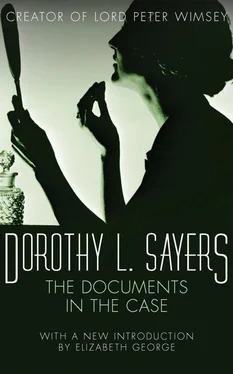‘I suppose so — from that point of view.’
‘And, if it was so, I should like to know it. Will you tell me, Mr Lathom, on your honour and without concealment, whether there was anything between my father’s wife and your friend Mr Munting?’
‘Good Lord, no!’ he said, taking the pan off the fire and shovelling the eggs and bacon out into a plate. ‘Nothing of the sort!’
‘Just a minute,’ said I. ‘Mr Munting is your friend, and you want to be loyal to him. That’s obvious. And I’m aware I’m asking you to do one of those things which people with public-school education don’t do. I am not a public-school man myself, and you must excuse me if I suggest that just for once you should come down to brass tacks and cut out the Eton-and-Harrow business. My father has died, and I want your personal assurance that he did not kill himself on your friend Munting’s account. Can you give it to me?’
‘On my word of honour, there was not the very slightest attachment or understanding of any kind between Mrs Harrison and Jack Munting. They rather disliked each other, if anything. Jack was married last Easter to a very charming woman, with whom he is much in love. He never gave a thought to Mrs Harrison, or she to him.’
I felt sure he believed what he said.
‘Wasn’t there a disturbance of some kind?’ I asked.
‘Oh, yes.’ A cloud passed over his face. ‘There was. That wretched potty woman, Miss Milsom, invented some sort of story. But it was the most absolute rubbish. And Mr Harrison came to see what utter nonsense it all was. My dear man, the woman’s in an asylum.’
‘There was no foundation for it then?’
‘None whatever.’
‘Then why did your friend Munting take it lying down, and let himself be kicked out of the house?’
‘I wish you wouldn’t keep on calling him “my friend Munting”, as if you took us for a pair of undesirables,’ he retorted, irritably. He picked at his eggs and bacon, and pushed the plate away again.
‘What else could he do but go? Your father was perfectly unreasonable — wouldn’t have listened to the Archangel Gabriel. Anyway, the more you protest about these matters, the less you’re believed. Munting did the right thing — cleared out and married somebody else. Couldn’t have a row with a man twice his age, you know.’
I got up.
‘Thank you very much, Mr Lathom. I’m sorry to have troubled you. I am very glad to have your assurance. Mr Munting is in town, I suppose?’
‘You’re not going to rake it all up with him?’
‘I should feel more satisfied if I had a word with him,’ I answered.
‘I wouldn’t. You can take my word for it. I mean to say, there’s Mrs Munting to be considered.’
‘I shouldn’t say anything to her. After all, it’s surely natural enough that I should wish to have Mr Munting’s account of the business.’
‘Yes — oh yes, I suppose it is.’ He still looked worried and dissatisfied. ‘Well, goodbye. If you really must see Munting, here’s his address.’
As I opened the door of the studio, I nearly tripped over Mrs Cutts, who was washing the linoleum. She came and let me out at the house-door.
‘Puttin’ yer money on the wrong horse, young man, ain’t you?’ she whispered.
‘Look here,’ I said, ‘you know something about this.’
‘That’s as may be,’ said she, slyly. ‘Mrs Cutts knows ’ow to govern ’er tongue. An unruly member, ain’t it, sir? That’s wot the Bible says.’
‘I’ve no time to waste,’ I answered; ‘if you have anything to say to me, you will find me at my hotel.’ I mentioned the name, and then, with a certain disgust at the business, slipped half a crown into her hand.
She curtseyed, and I left her bobbing and dipping on the doorstep.
I cursed myself for a fool as I set off to find Munting. Undoubtedly Lathom would have warned him by telephone of what to expect. I was sure of it when I saw him. He struck me as conceited and pretentious — the usual type of modern literary man.
He was perfectly polite however; assured me in a tone of the utmost sincerity that the story about himself and Margaret Harrison was entirely unfounded, and referred me back to Lathom for evidence as to my father’s state of mind in the week preceding his death.
Finding myself quite unable to penetrate this polished surface of propriety, I took my leave. The manner of both men left me in no doubt that there was something to conceal, but I could get no farther than a moral certainty.
Mrs Cutts seemed to offer the best hope of information, but I could not as yet reconcile myself to handling so dirty a tool. It occurred to me that it might possibly be worth while to get hold of Miss Milsom. I was not at all clear in my mind that her madness might not have some method in it.
At first I could not think how to trace her. I could have asked Margaret Harrison, of course, but I did not want to do that. Finally, I decided to call on the local padre, the Rev. Theodore Perry, and see if he knew where his lost sheep had strayed to.
I knew him well, of course, and it did not seem unnatural that I should ask after the welfare of a woman who had been for some time in my father’s employment. I sandwiched the question in, in the course of a casual conversation, and he told me at once what he knew.
‘Poor woman, I’m afraid she is not altogether normal. One hopes it is only a passing phase. I don’t quite know where she is — one of these nursing-homes of the modern sort, I think. Her sister, Mrs Farebrother, would be able to tell you. No, I don’t suppose they are very well off. The fees in these places are high. In the days of faith — or superstition, if you like — a convent or a béguinage would have provided the proper asylum for such a case, with some honest work to do and a harmless emotional outlet — but nowadays they make you pay for everything, not only your pleasures.’
He gave me Mrs Farebrother’s address, and I said I would see what could be done. He smiled at me in a futile, clerical way, and said it would be a work of charity.
I left him, feeling anything but charitable, and went to see Mrs Farebrother. She seemed to be a good, honest, sensible woman, worried by family and financial cares, and accepted gratefully my suggestion of a small pension, during the period that her sister might be requiring medical care.
The interview with Agatha Milsom was a painful one to me. The woman is undoubtedly quite unbalanced, with a disagreeable sex-antagonism at the bottom of her mania. According to her, my father had treated his wife with abominable cruelty, and I was obliged to listen for a long time to her rambling accusations. The name of John Munting roused her to such excitement that I was afraid she would make herself ill; unfortunately, I could get nothing reliable out of her. For one thing, she was obsessed with the idea that he had designs upon her maiden modesty, and for another, many of her statements were so ludicrous that they cast suspicion over the rest.
As regards my father, however, I obtained one thing. I suggested that her memory of certain domestic incidents might be at fault, and in proof of her assertions she promised to get back from her sister, and send to me, all the letters she had written home during the previous two years.
It seemed to me that, since her mental deterioration had come on only gradually, the letters written at the time might possibly be considered to attain a reasonable level of accuracy. She kept her promise, and from this correspondence I selected the letters of relevant date, and these are the documents included in this dossier. It will be seen that great allowance must be made for bias; that much conceded, the statements may, I think, be accepted as having a basis in fact.
Читать дальше












